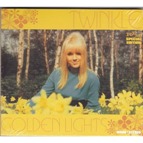Girl singers of the 60s were in full force by the middle of that decade, but unlike Sandie Shaw, Dusty Springfield and, dare I say it, Cilla Black, Twinkle was something of a rarity as she, like Jackie Trent, wrote her own songs and coming from a well-to-do background didn’t do her any harm either.
In 1964, Lynne Annette Ripley was 15 years old and should have been out with her friends and looking forward to leaving school, but instead she loved to sit and write songs. She was born in Surbiton and known almost from birth by her family pet-name Twinkle and attended Queen’s Gate School with Camilla Rosemary Shand, now known as Camilla Duchess of Cornwall. Her father was a local politician and an amateur songwriter so she was encouraged when she showed signs of wanting to write. She began penning songs around age 14 and her first attempt was a thing called A Little Bit Sad, but it was never recorded. Her first two offerings Unhappy Boy and The Boy I Once Knew both failed to make any impact. She said, “I was protected as a child and any boyfriend I had to be from Harrow or Eton. But I’d see motorbikes flashing by on the Dorking by-pass and I longed to be around people like that which is what inspired me to write Terry.”
Her elder sister, Dawn, used to write little features for girlie magazines like Jackie and Mirabelle and at school, the brothers of her friends had formed a band called the Trekkers which used to perform at the an unlicensed premises called Esmeralda’s Barn. The group were led by John Bloomfield who let Twinkle perform with them once a week.
She often attended showbiz parties with her sister where one night she was eyed up by Dec Cluskey, of The Bachelors. One night they were all having dinner in Kingston, and Twinkle’s father pulled out a demo of his daughter’s song called Terry and gave it to Dec which was then played to their manager Phil Solomon. The song was a teenage tragedy song, a death disc as they were known, about the passing of a boyfriend in a motorcycle crash. Dick Rowe at Decca records, who had turned down the Beatles, signed her and paired her with producer Tommy Scott. They went into Regent Sound Studios in London’s Denmark street and with engineer, Glyn Johns in charge they cut the track which featured then-session guitarist Jimmy Page. The track conjured up a dark mood with its woeful backing vocals, haunting organ and 12-string guitar all arranged by Phil Coulter. It was very much in the vain on Leader of the Pack which actually came six months later. Despite being banned by the BBC due to the then-controversial line ‘drove into the night, accelerated his motorbike’ the song still reached number four. It was helped by her sister who wrote about it in Mirabelle and this was followed by her TV debut on ITV’s Thank Your Lucky Stars. Soon after, she made her first public appearance supporting Jerry Lee Lewis in Brighton.
In early 1965, Twinkle was writing the follow-up to Terry called Golden Lights which was inspired by the sign she saw from her hotel window in Blackpool. Right opposite was the Blackpool theatre and the headlining act were the Bachelors all lit up in golden lights, although the song refers to a fictitious boyfriend who suddenly becomes a star and thus doesn’t want to know his girlfriend anymore. By the time the song had entered the chart; she had ditched Dec and was now dating Peter Noone of Herman’s Hermits.
Because it shared the same downbeat mood of its predecessor the song peaked at number 21. The record company were unsure about recording an album at this time, so an EP titled A Lonely Singing Doll was released and the title track was an English language version of that year’s Eurovision Song contest entry for Luxembourg called Poupée de cire, poupée de son which was written by Serge Gainsbourg. It failed to sell but a mint condition copy is now in the region of about £70.
Twinkle recorded six singles in total for Decca including a cover of Skeeter Davis’ End of the World. Her last single was called What Am I Doing Here with You which was a lyrical reworking of 24 Hours From Tulsa. After a short spell of disappointing one nighters she effectively retired from the music business at the age of 18.
In 1969, she had a change meeting with the Stones’ producer Andrew Loog Oldham which resulted in her recording Mickey, a eulogy to her late boyfriend Michael Hannah. It was produced by Manfred Mann’s Mike D’Abo and released on Instant records, a subsidiary of Oldham’s Immediate label. It went nowhere.
She had a spell as a staff writer at ATV music but she admitted that she found it hard to write with other people. At this time she bizarrely teamed up with her father and recorded one track for Bradley’s records called Smoochy Smoochy under the guise Bill & Coo.
In the 80s she suddenly had some royalties when the The Smiths recorded a cover of Golden Lights as the B-side of the 1986 hit Ask, but if you look at your copy of the record you won’t find it, it was only available on the cassette single. You will, however, find it on the US-only released Louder Than Bombs which was a compilation of B-sides and BBC sessions.
During the 90s family commitments prevented any sort of comeback although she was occasionally seen on the nostalgia circuit. In the 21st century Twinkle followed in Doris Day and Chrissie Hynde’s footsteps by spending her time caring for animals at her home on the Isle Of Wight. Sadly she lost her five year battle with cancer on 21st May 2015.
